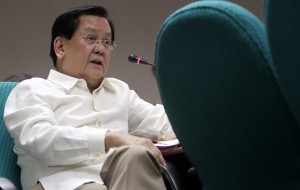Crisis powers for Aquino seen to pass next month
MANILA, Philippines–Sen. Sergio Osmeña III on Tuesday said he hoped to pass next month the resolution granting emergency powers to President Aquino to address the looming power crisis, but would ensure that the measure would not unnecessarily jack up electricity prices.
Osmena, chair of the Senate Committee on Energy, also said he should not be blamed for any power supply shortage, since he had long been warning of such a scenario since 2011.
According to Osmeña, the resolution would give the President the power to exempt certain establishments from the Biofuels Act so they could use pure diesel instead of biodiesel when necessary to address a supply shortage.
These special powers need not have a deadline, and could be forever unless amended by future Congresses, he said.
Beneficiary
Article continues after this advertisementExpected to benefit from this would be the natural gas plant of Kepco-Ilijan, which takes days for a cleanup when it uses biofuels. Those days reserved for the cleanup could be used instead for power generation.
Article continues after this advertisementAn additional 550 megawatts is expected from the Ilijan gas plant using pure diesel for the period of the shortage.
Osmeña also seeks to authorize the President to refund Power Sector Assets and Liabilities Management for the extra cost of putting up temporary storage fuel for the Ilijan plant.
He further said he did not think the interruptible load program (ILP), from which 1,000 MW would be available during the summer of 2015 when the supply shortage would be acute, should be made mandatory.
Under the ILP, customers with their own generator sets would be asked to use these instead of tapping into the supply of distribution utilities when there is a power shortage.
“The ILP works better when it’s not mandatory, when its voluntary,” he said.
He said some might be reluctant to commit a big number in case they might not meet this.
According to Osmeña, it was enough to know the capacity of those willing to participate in the ILP.
When a shortage looms, and an extra 150 MW is needed, one of the participants could be asked to use 150 MW of their own power.
“You will not use all of them at the same time, you will just choose who will join at a particular time,” he said.
Enough for shortfall
The ILP, along with output of the Ilijan plant, would be enough to meet the expected shortfall during the hottest day next summer which would be 700 to 800 MW, he said.
Osmeña also said he had opposed the initial plan seeking special powers for the President to buy generator sets from abroad, which would result in electricity rates of P35 per kilowatt hour.
He did not want a repeat of the 1992 situation where the government contracted power at very high rates, and people ended up paying for power they were not using.
“We will find a way to access power without having to pay through the nose,” he said, adding he believes this would be done with the ILP and the operation of the Ilijan gas plant using pure diesel.
